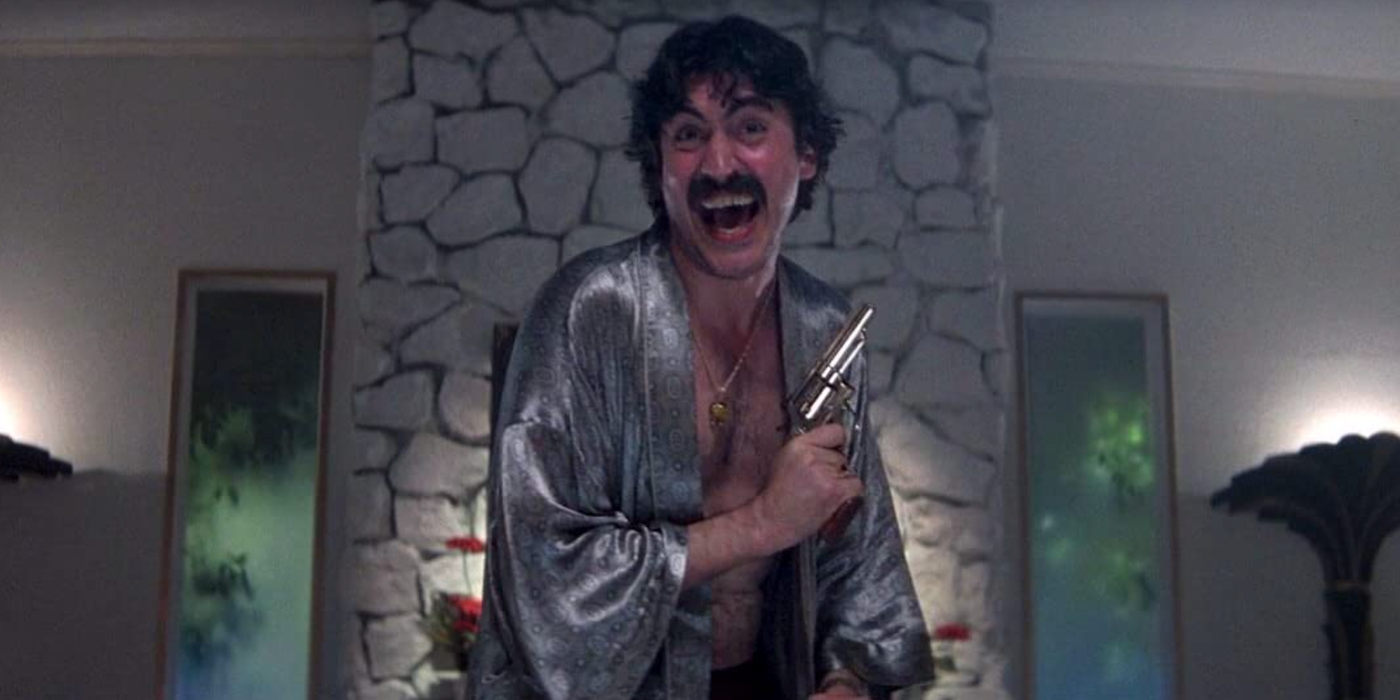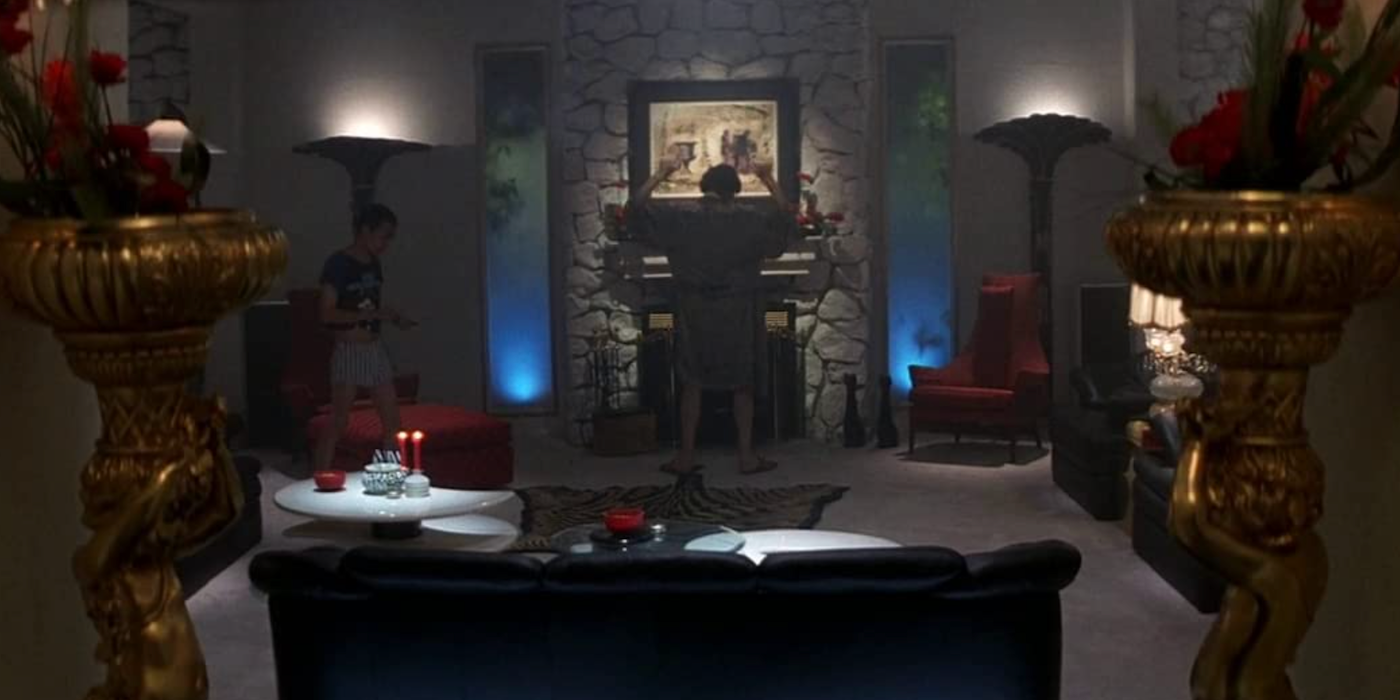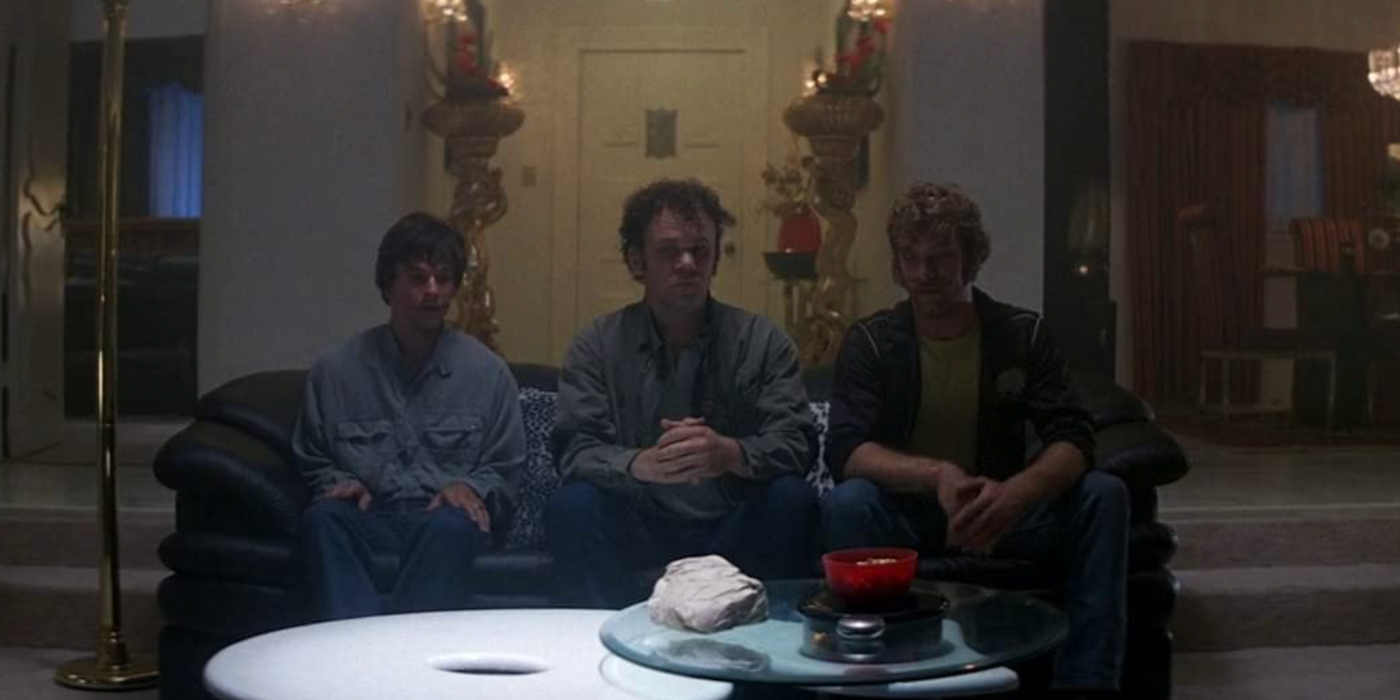It may the most intense and memorable scene from 1997's Boogie Nights, writer-director Paul Thomas Anderson's epic about the 1970s and 80s pornographic film industry. Dirk Diggler (Mark Wahlberg), Reed Rothchild (John C. Reilly), and Todd Parker (Thomas Jane) go to the home of Los Angeles drug kingpin Rahad Jackson (Alfred Molina) to sell him a half kilo of cocaine that's actually a bag of baking powder. Strung out, sweating, and doing everything they can to keep from jumping out of their own skins, they sit and watch as Jackson, manically high and clad only in black bikini briefs and an open silk robe, freebases crack, waves around a loaded pistol, and sings along to "Sister Christian" and "Jessie's Girl." Adding to the unbearable intensity is the incessant sound of popping fireworks thrown onto the floor by Jackson's boy toy, who wanders around the living room as if in a separate world.
As Jackson, Molina is brilliant. Hyper, hysterical, and menacing, he makes the most of his 10-minute appearance and creates one of the big screen's most terrifying characters. What some viewers may not know, though, is that Molina's Jackson is based on the real life Eddie Nash, notorious drug trafficker and alleged mastermind behind the grisly 1981 Wonderland Murders. In Boogie Nights, Anderson creates a story loosely based on events in the lives of the personalities who inhabited the "golden age" of X-rated movies. Wahlberg's Dirk Diggler is, of course, a thinly veiled version of porn star John Holmes, and in the 1980s, the lives of Holmes and Nash would tragically intersect, culminating in one of the most shocking mass murders since the Manson family killings of 1969. The story of Eddie Nash and his association with Holmes is so fascinating and sordid, it was also the subject of 2003's Wonderland, with Val Kilmer as Holmes and Eric Bogosian as Nash.
Based on Eddie Nash
At first glance, Nash's life would seem to be a true riches-to-rags-to-riches tale. Born Adel Gharib Nasrallah in Palestine in 1929, Nash was the son of wealthy hoteliers. When his brother-in-law was killed by Israeli Defense forces in the early 1950s, Nash fled Palestine and came to the U.S. with just $7 to his name. As a young man, Nash had stars in his eyes and dreamed of Hollywood fame. He tried his hand at acting and landed a bit part as "Nash the Jockey" in a 1952 episode of the Cisco Kid TV series. Acting fame eluded Nash, however, so he turned to entrepreneurial pursuits, opening a hot dog stand on Hollywood Boulevard in the 1960s. It wasn't just frankfurters Nash was selling, though. He got involved in drug trafficking, amassing enough money to establish a series of nightclubs in the 1970s, including The Odyssey, Ali Baba's, and the Kit Kat club. Nash became a sort of Steve Rubell of the West Coast. His clubs were destinations for the "in crowd," attracting celebrities and the people who wanted to be around them. Nash was also a primary provider of drugs for many a club-goer, which kept his hot spots crowded and the money flowing. By the late 1970s, Nash was a millionaire many times over.
Enter John Holmes. Tall, gangly, and not particularly good-looking, Holmes was an unlikely X-rated movie star. In the 1970s, though, he was a superstar. Holmes was the first male actor in adult films to appear as a recurring character, detective Johnny Wadd, in a series of X-rated movies. In Boogie Nights, Dirk Diggler creates a similar character, the crime-fighting, karate chopping Brock Landers, who, like Johnny Wadd, becomes a recurring character in a porn film franchise. Over his career, Holmes appeared in thousands of adult films and had enough name recognition to earn "celebrity" status, even in mainstream circles. Holmes' fame wasn't based on his looks or his acting, but, like his alter ego Dirk Diggler in Boogie Nights, a much-blessed part of his anatomy. Nash, a financier and fan of adult films and a man thirsty to be celebrity-adjacent, welcomed Holmes into his sphere. Holmes and Nash shared a love of the fast life, which included a seemingly endless supply of drugs. It appears Molina's portrayal of Nash (aka Rahad Jackson) as a wild, deeply addicted semi-lunatic was to a large extent accurate. In a 2021 Rolling Stone article, The Devil and John Holmes, Nash was described as "a drug dealer and a heavy user. His drug of choice was freebase, home-cooked crack cocaine, and he was smoking it at the rate of two to three ounces a day. He always had large quantities of coke, heroin, Quaaludes and other drugs at the house." In a 1998 Playboy Magazine article, Holmes' ex-wife Laurie described Nash as an "awful man" and recounted some of his more wanton behaviors.
A Life of Crime
As the 1970s became the 1980s, Holmes' addiction had effectively ended his adult movie career, just as Dirk Diggler's drug habit in Boogie Nights marked the end of that character's stardom. Burned out, unreliable, and unable to perform on camera, Holmes turned to crime to survive, including becoming a drug runner for the notorious Wonderland crime gang, named for the home on Wonderland Avenue in trendy Laurel Canyon where the gang resided. Desperate for cash, Holmes is alleged to have helped the gang set up a robbery of Nash's home. Knowing where Nash stored his money and drug supply, Holmes is believed to have paid a visit to Nash's San Fernando Valley home on June 29th, 1981, leaving the back door open when he left, which allowed the gang to enter. They stormed the place and forced Nash to open his safe while they held a loaded gun in his mouth. The gang got away with thousands of dollars of Nash's money and a plentiful supply of cocaine and heroin. The nerve-wracking Boogie Nights scene featuring Molina that ends in a hail of gunfire was inspired by Nash's real-life robbery incident.
From the outset, Nash suspected Holmes was involved in the robbery, and two days following the incident, four people were found bludgeoned to death at the Wonderland Avenue home. Holmes later claimed that Nash, in retaliation for the robbery, forced him to lead Nash's bodyguards to the Wonderland house and watch as they beat the inhabitants to death. Holmes was charged with the murders in 1982, but was ultimately acquitted. Because Holmes refused to cooperate with authorities, Nash escaped any charges until 1990, when he went on trial for the planning of the murders. Nash once again sidestepped prison when the trial ended in an 11-1 hung jury. Proving he was every bit the miscreant as portrayed by Molina in Boogie Nights, Nash later admitted he gave a $50,000 bribe to a juror in exchange for his acquittal. Holmes, the one person who could have implicated Nash in the Wonderland murders, died of AIDS in 1988, all but ensuring Nash's freedom.
The Later Life of Eddie Nash
Nash continued his reign as one of Southern California's most feared drug kingpins for another decade, but federal investigators had been watching him since his 1990 acquittal, and in 2000, at age 70, Nash was finally indicted for drug trafficking, money laundering, conspiracy in planning the Wonderland murders, and jury tampering. To add Hollywood flair and celebrity connections to the whole Nash story, pianist and entertainer Liberace's former partner Scott Thorson (portrayed by Matt Damon in the 2013 HBO drama Behind the Candelabra) testified that he had been at Nash's home the night of the Wonderland murders and had witnessed Nash giving his bodyguards the order to carry out the killings. In a 2021 Rolling Stone interview, Thorson said he had kept quiet for years about what he knew. "I was scared. I knew that Nash was dangerous and that if he could get a chance to kill me, he would.” Nash was found guilty, and in a plea agreement, was sentenced to 37 months in prison. In ill health following his release, Nash lived quietly and out of the spotlight until his death in 2014 at age 85.
It's particularly telling that there seems to be a dearth of information about Nash's personal life, including any tales or anecdotes from friends and associates that might shed a light on his humanity. Yes, Nash's life of crime and corruption is well-documented, but little is known about the man himself - what made him tick, what propelled him, and what led him down his deranged, destructive path. Did Nash actually have any friends, or did people flock to him simply because he could get them a fix or an entry into the Hollywood celebrity circle? Were people so terrified of him that they chose not to talk about him at all for fear of what may happen if they did? It appears that most people who knew him would rather forget him, and those who have spoken about him tell the same story of an evil, soulless individual, eager for fame, driven by money, and fueled by drugs. Maybe that truly was Nash's essence and nothing more. Looking at the character of Rahad Jackson in Boogie Nights, it appears, then, that Alfred Molina nailed the spirit of Eddie Nash squarely on the head.



